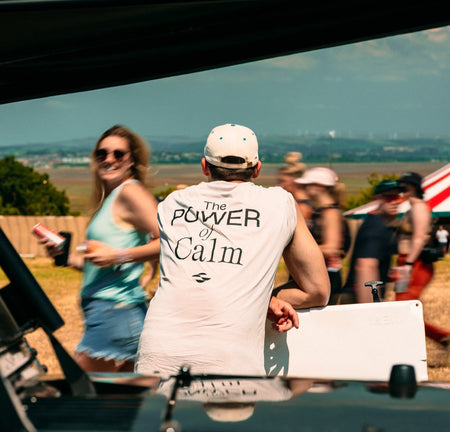We've all had those nights: the mind won't slow down, the body can't settle and the clock ticks on. This might be once in a while or an ongoing cycle; either way, poor sleep can affect almost every part of life. For those exploring natural ways to unwind and reset, CBD has become a popular companion to the nightly routine.
Why are so many people turning to CBD for sleep?
CBD (short for cannabidiol) is a non-intoxicating compound found in the cannabis plant. Unlike THC, it won't get you high. Instead, it interacts with the body's endocannabinoid system (ECS), which plays a role in balancing mood, stress, inflammation and sleep.
For many people, CBD helps to dial down the physical and mental noise that can get in the way of rest. Not by sedating, but by helping the body return to a calmer baseline. It's this supportive, non-sedative quality that makes CBD appealing to people who want to sleep more easily, without feeling disconnected or dulled.
While research into CBD and sleep is still developing, the early findings are promising. One 2019 study explored whether CBD could support people with anxiety and poor sleep. Participants were given 25mg of CBD per day in capsule form. After one month, 66.7 per cent reported improved sleep and 79.2 per cent reported reduced anxiety. These results suggest a dual benefit: easing anxiety while also supporting a better night's sleep.
How does CBD help your sleep?
Good sleep isn't just about being tired. It's about the body and brain reaching the right state to rest. For many people, stress, anxiety or overstimulation blocks that process.
CBD may support sleep by:
- Encouraging a sense of calm, both mentally and physically
-
Reducing overactive thought patterns
- Helping regulate cortisol (a stress hormone)
- Supporting more consistent, uninterrupted rest
Importantly, CBD isn't designed to knock you out. Instead, it helps make sleep feel more accessible. You may still wake in the night or have occasional restless evenings, but many people who take CBD report falling asleep faster, waking less often and feeling more refreshed in the morning.
CBD oil for sleep
CBD oil is a popular option for those who want a fast-acting and flexible approach. Many people take their CBD oil 30-60 minutes before bed, after their evening routine or when winding down from a stressful day or late screen exposure.
CBD gummies for sleep
CBD gummies are a simple and pre-measured option which suits many bedtime routines. Gummies are digested through the stomach, so they take a little longer to work than oils but many people find the effects build gradually and last longer through the night. They're easy to pair with other sleep-friendly habits like low light, screen-free time or a warm drink.
Gummies may be a good choice if:
- You dislike the taste or feel of CBD oil
- You want consistent effects without needing to measure a dose
-
You value a calm wind-down that doesn't require much thought
CBD drinks and sleep
CBD drinks are designed to slot into real routines. Many people use them as a post-dinner wind-down, especially in place of caffeine, alcohol or sugary options that can interfere with sleep. Drinks are digested similarly to gummies, with effects typically felt within an hour. They work well as part of a relaxed evening rhythm; they are something chilled to sip while reading or listening to music.
How much CBD should you take for sleep?
There is no single 'correct' dose. The right amount depends on your weight, metabolism and sleep patterns. But here's a typical range to help you find your starting point:
- 30mg: a light, supportive dose for general relaxation
- 31-50mg: commonly used for sleep support
If you are new to CBD products, start with a lower dose and gradually increase it over a period of time. Start with one product, at a consistent time, and note how you feel across several nights. The effects of CBD build with regular use.
How to build a CBD sleep routine that works
CBD works best when it's part of a routine that helps your body and mind recognise when it's time to switch off. That doesn't mean building a strict sleep schedule or a flawless wind-down ritual, but it does mean creating some signals your system can rely on.
Start by taking your CBD at the same time each evening. Whether it's a dropper of oil or a gummy, consistency helps your body build its own rhythm. Choose a time that's at least 30 to 60 minutes before bed, so the effects have time to build.
Lowering the lights, reducing screen time and switching to quieter activities such as reading, journalling or a warm shower, all send the right cues. These habits aren't about perfection. They're about pacing your evening so your body isn't trying to rest while your brain is still active.
Avoid stimulants like caffeine or alcohol in the evening. Both can disrupt your ability to stay asleep, even if you fall asleep quickly. And lastly, give yourself space to settle. That might be five minutes of quiet before getting into bed or simply sitting with a warm drink. Paired with CBD, these cues help nudge your system toward rest, rather than force it.
CBD isn't a replacement for good sleep hygiene; it's a way to strengthen the habits that help it stick.
Who might CBD help most?
CBD can be a helpful addition to the evening routine for a range of people, particularly those who experience sleep disruption tied to stress, lifestyle or difficulty switching off.
If you often find yourself lying in bed with a racing mind, turning over tomorrow's to-do list or dwelling on unresolved thoughts, CBD may help create the mental space needed to unwind. It's not about blocking thoughts, but about softening their edge so you're not so alert when you want to rest. For others, the challenge isn't falling asleep but staying asleep. If you tend to wake up at 2am and struggle to settle again, the gentle, sustained support from CBD formats like gummies or oil might help you stay settled for longer through the night.
You might also benefit if you feel tired but wired – physically drained but mentally overstimulated. CBD may help ease that gap, making it easier to feel calm enough to sleep naturally.
And for anyone trying to cut down on alcohol or move away from sleep medications, CBD offers a non-intoxicating, plant-based option to support rest without the same side effects or dependency risks.
Like all wellbeing tools, CBD works best when used consistently, thoughtfully and as part of a broader approach to good sleep. If you're managing a health condition or taking other medications, it's always wise to speak to your GP before getting started.
CBD and sleep: Finding rest, naturally
Sleep doesn't always come easy – especially when the day (and your brain) doesn't know when to stop. The pace, the screens, the overstimulation. It all adds up. That's where CBD can help. Not as a knockout or a quick fix, but as a gentle prompt to slow down, breathe deeper and get ready to rest.
For many, CBD has become more than a supplement; it's part of a nightly ritual that marks the shift from doing to being. Whether it's a dropper of oil, a gummy with a book or a chilled drink to end the day, the act of taking CBD becomes a signal: this is the moment I begin to unwind.
It's not about sedating yourself into sleep. It's about creating space to feel calm enough for sleep to come naturally. And when you wake, it's with a clearer head, not a heavy one.
So if better sleep is the goal, CBD could be the difference that helps everything else click into place.





